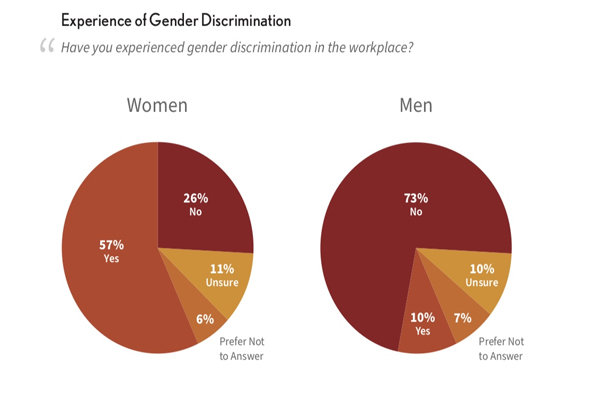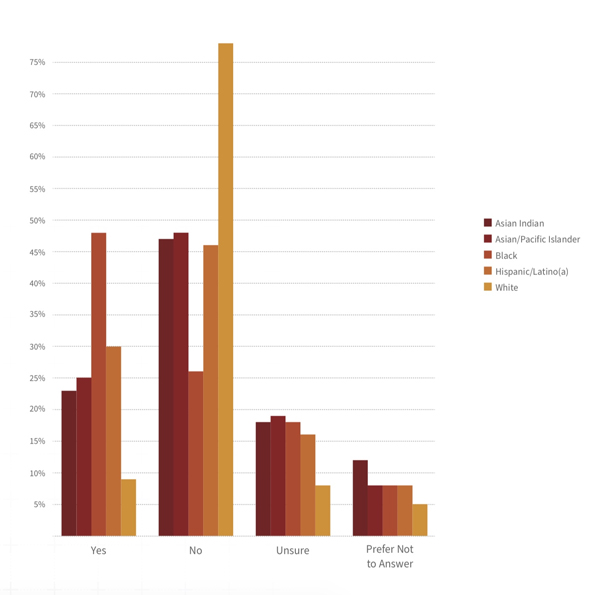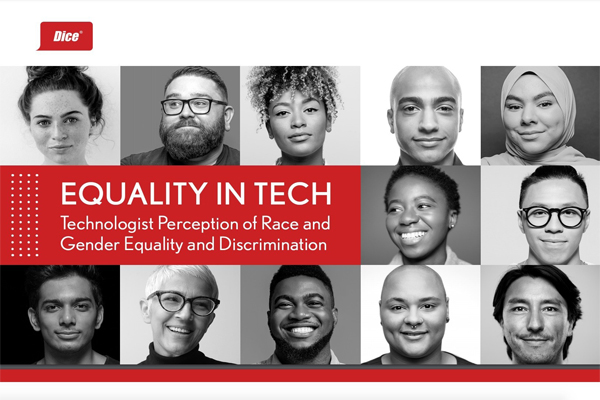The tech industry still has a long way to go to fix inequality and discrimination to attract more diversity, according to a report carried out by tech career hub Dice.
Its newly released report Equality in Tech Report reveals high levels of inequality and discrimination in tech; thanks to perspectives from 9,000 technologists across the US on racial and gender equality in tech and within their organisations. It also illustrates how important diversity, equity and inclusion (DE&I) efforts and values are to technologists; and how they believe their current organisations are performing in these areas.
GENDER INEQUALITY IN TECH
On gender inequality, 57% of women say that they have experienced some form of gender discrimination; drastically outnumbering the number of male respondents who said the same (10%). Gender discrimination is likely to be underreported in the workplace, since many are afraid that speaking out could have a negative impact on their performance reviews and careers, noted the report. In turn, that could impact what both men and women experience and witness when it comes to discrimination within their organisations.

Virtually half of technologists identifying as women (49%) believe they’re underpaid relative to other people with the same occupation and skill level; compared to 45% of men. Additionally, only 37% of women technologists said they were extremely or moderately impressed with their company’s response to gender diversity and inclusion movements; and 17% expressed that they “are not all impressed”.
Furthemore, 59% of women said that an employer’s reputation regarding DE&I is extremely or moderately influential in their decision to work for that company; compared to 42% of men.
RACIAL DISCRIMINATION IN TECH
On racial discrimination in the tech industry, Black respondents (48%) were the most likely to have experienced racial discrimination; followed by Hispanic/Latinx (30%), Asian/Pacific Islander (25%), Asian Indian (23%) and White technologists (9%).

White technologists were significantly more satisfied with their careers overall (at 69%) compared to their Hispanic/Latin (66%), Black (61%), Asian/Pacific Islander (61%), and Asian Indian (58%) colleagues. Regardless of your perspective on the implication of data, the fact remains that a gap exists in career satisfaction between White technologists and other racial groups.
In addition, White technologists were also significantly more satisfied than almost all other demographic groups with their current/most recent job, with the exception of Asian/Pacific Islander employees, with whom they were even. Of all the groups, Black and Hispanic/Latinx technologists were notably dissatisfied (at 21% for both groups, which is at least four points higher than any other group).
COMPENSATION FAIRNESS
Regarding compensation “fairness”, there’s a significant “perception gap” when it comes to race and compensation; with Black, Asian Indian, Asian/Pacific Islander and Hispanic/Latinx technologists, more likely than White technologists to feel that they’re underpaid relative to other people in the same occupation and skill level. In fact, 53% Asian Indian and Hispanic/Latinx technologists believe they are underpaid, followed by 50% Black technologists, compared to 48% White colleagues.
Furthermore, 65% of Black respondents thought that a reputation for DE&I was an important factor (extremely or moderately influential) in whether they would work for a particular company; followed by 53% Asian Indian, 51% Asian/Pacific Islander, 50% Hispanic/Latinx and 41% of White technologists.
URGENT NEED FPR DIVERSITY IN TECH
Commenting on the report findings, Dice (a DHI Group brand) CEO Art Zeile stated: “In sharing this important report, we seek to bring further clarity to the discussion around the urgent need to increase both gender and racial diversity within the technology industry, providing insights that we believe can lead to actionable solutions that all industry participants can embrace. We will only succeed in this profoundly vital effort through our collective commitment to immediate and real change.”
Adding to his comments, Michelle Marian, CMO of Dice, said: “I cannot overstate the importance of this data in highlighting the crucial work we need to do when it comes to diversity, equity and inclusion, both on a personal and professional level. Every member of our organisation wants to be part of the solution, and impactful insights like those included in this report provide an all-important step in identifying the areas where we can all be the drivers of change.”
Click here to download a copy of the report.





































